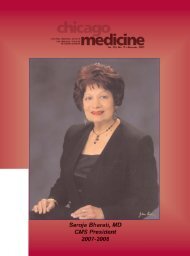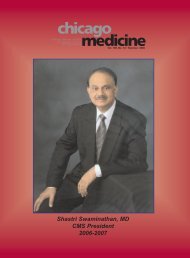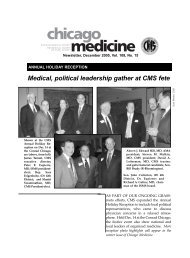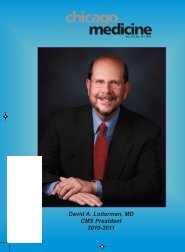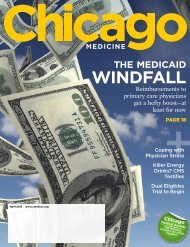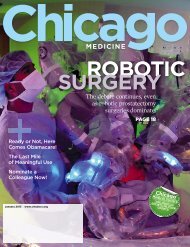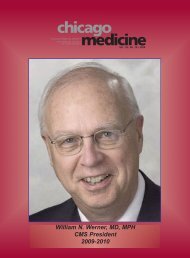Summer 2003 - Chicago Medical Society
Summer 2003 - Chicago Medical Society
Summer 2003 - Chicago Medical Society
Create successful ePaper yourself
Turn your PDF publications into a flip-book with our unique Google optimized e-Paper software.
education brochure, and a herbal supplement patienthistory checklist. Order forms for the seriesare available at www.spine.org/herbal_supplements.cfmor by contacting NASS at (708) 588-8080.<strong>Medical</strong> assisting professioncontinues to growAccording to the U.S. Bureau of Labor Statistics,medical assisting is quickly becoming one of thenation's fastest growing careers through 2010. Theprofession's growth can be attributed to severalWhat’s positiveA federal report issued recently says that deathrates from the four leading types of cancer havedeclined since 1990. Advances in detecting andtreating cancer, along with increased anti-tobaccocampaigns, have helped improve the prognosis forpatients with lung, colon, breast, or prostate cancers-TheNew York Times, Sept. 3.A new method of kidney preservation keeps kidneysfresher for longer, and may increase the possibilitythat a kidney can be given to a patient inneed. The Lifeport Kidney Transporter, inventedby Des Plaines-based Organ Recovery Systems,preserves kidneys for 48 to 72 hours, and was recentlyapproved by the Food and Drug Administration-<strong>Chicago</strong>Sun-Times, Aug. 18.The Centers for Disease Control reports that enoughinfluenza vaccine will be available for everyone whowants it this flu season. Health care workers, the elderly,and those with chronic medical disorders willnot be given priority for flu shots, as they have beenin recent years. More than 36,000 Americans diefrom influenza each year, and over 114,000 are hospitalized-TheNew York Times, Aug. 22.Harvard <strong>Medical</strong> School researchers announced thatthey have developed an anthrax vaccine which maybe more effective than the current vaccine, based oninitial testing in mice. While the current vaccine simplytargets anthrax toxins, this new vaccine is designedto prompt the immune system to attack theanthrax bacterium-Wall Street Journal, Sept. 2.factors, including technological advancements inhealth care and a predicted surge in the number ofphysicians' offices and outpatient care facilitiesneeded to support the growing number of elderlyAmericans. The American Association of <strong>Medical</strong>Assistants, which recently released its new RoleDelineation Study, says that over the next fiveyears, medical assistants will be assisting withmore clinical and patient care procedures, patienteducation, management and supervisory tasks,coding and billing, intravenous procedures, andmedical records•Uppers & D ownersWhat’s positive today in medicine and what’s not? Each issue of <strong>Chicago</strong> Medicine takes a look.What’s notWhile many U.S. children diagnosed with cancersurvive, they are often confronted with relatedhealth problems later in life, including heart disease,learning disorders, and cancer relapses, accordingto a report issued by the Institute of Medicine-WallStreet Journal, Aug. 27.<strong>Chicago</strong>'s blood supply has reached dangerouslylow levels, and blood bank officials have issued urgentpleas to encourage donors to help shore up reserves.Blood shortages are common at the end ofthe summer, when many people have been on vacation,but the crisis seems especially acute this year, asone local bank has reached its lowest level in 20years-<strong>Chicago</strong> Sun-Times, Aug. 22.Providing further evidence of the rising cost ofhealth care in America, Ford Motorcars reports thatit spent $2.8 billion last year on health care for employees,more than was spent on steel for cars andtrucks. Contract talks between the United AutoWorkers and Detroit automakers have been tense,with health care coverage being a primary stickingpoint-<strong>Chicago</strong> Sun-Times, July 16.According to a study by the Georgetown University<strong>Medical</strong> Center, nearly 50 percent of 800 gynecologistssurveyed acknowledged routinely performing amore dramatic form of hysterectomy than may bemedically necessary. In addition, over 60 percent saidthey did not give their patients the choice of a lessdrastic surgery that would keep the cervix intact-<strong>Chicago</strong> Tribune, Aug. 17.•8 <strong>Chicago</strong> MedicineVol. 106, No. 11



